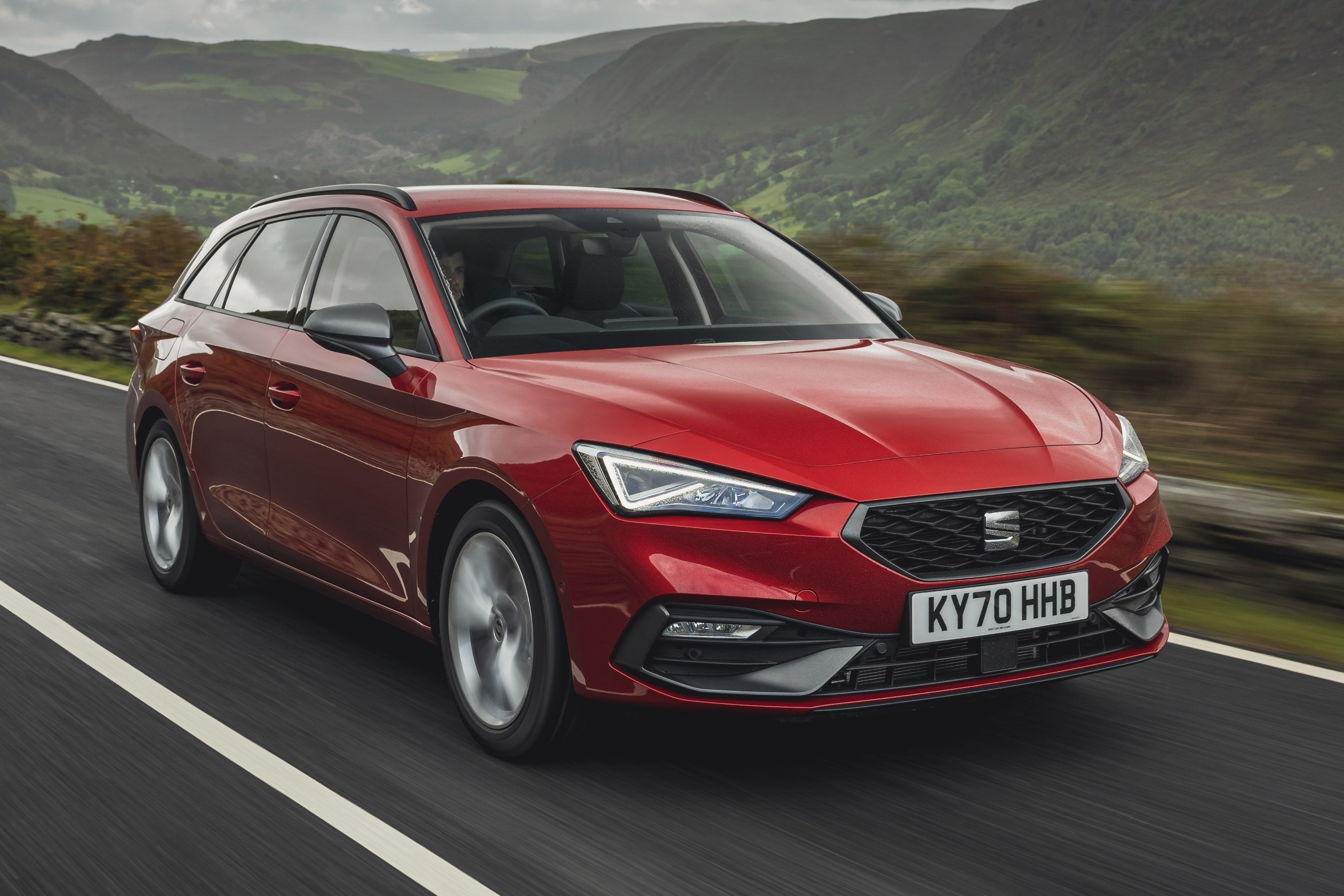SEAT Leon Estate Review 2025: Price, specs & boot space
Written by Andrew Brady
Quick overview
Pros
- Sharp handling
- Efficient engines
- Excellent value for money
Cons
- Infotainment is irritating on the move
- Sports suspension isn't the most comfortable
- A Skoda Octavia Estate is more practical
Verdict: Is the SEAT Leon Estate a good car?
"The SEAT Leon Estate manages to be both sporty and practical, with a touch of premium-ness chucked in for good measure. It's not going to break the bank, either, with competitive prices and a range of efficient engines."
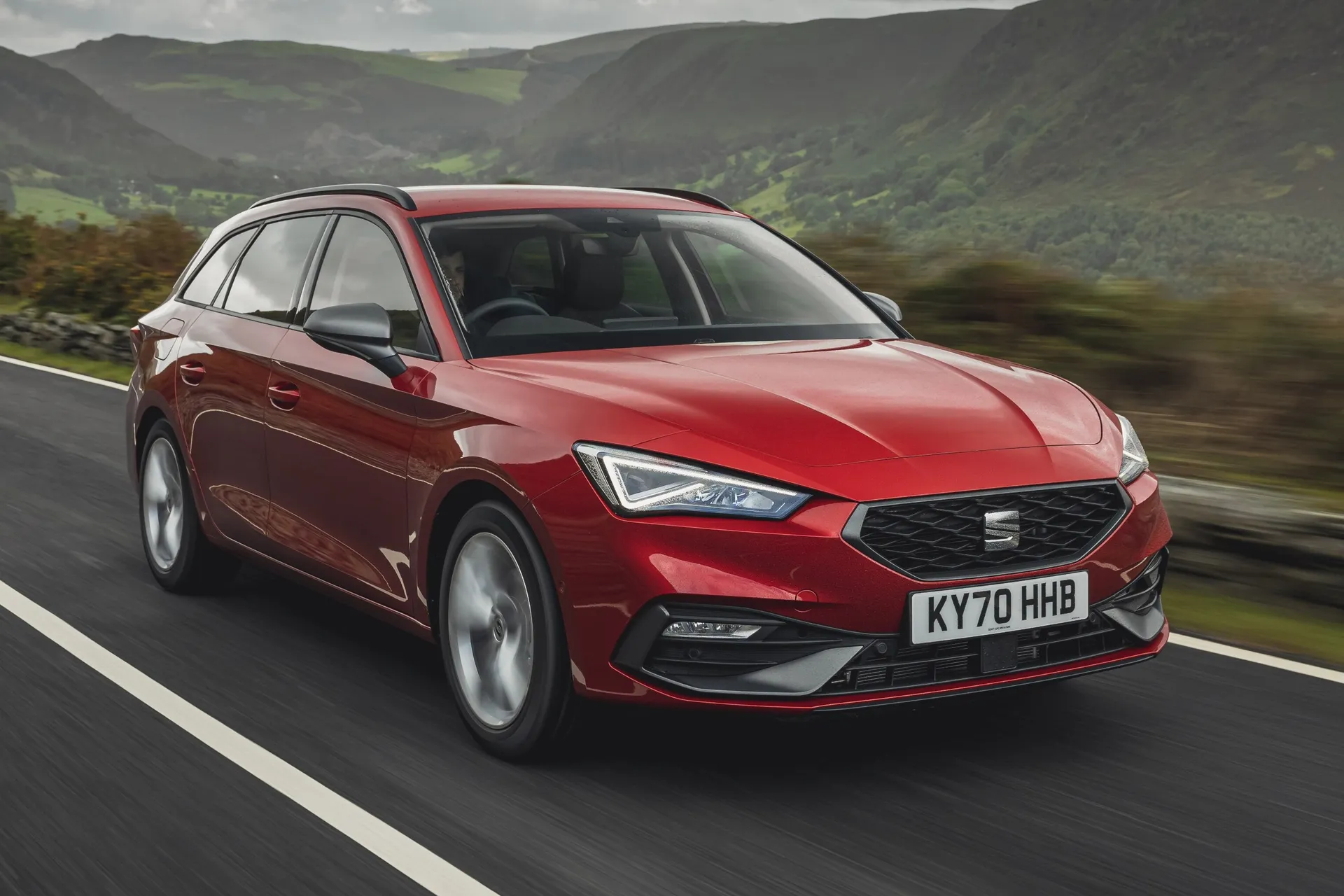
If you're searching for a new family car, you'll have noticed that the market is dominated by small SUVs like the SEAT Ateca, Nissan Qashqai and Kia Sportage. While these are all hard to fault, you shouldn't overlook the humble estate car, such as the Seat Leon Estate we're reviewing here.
The SEAT Leon is very similar to the Volkswagen Golf and Skoda Octavia (it shares its mechanical bits with both), yet with a healthy dose of Spanish flair. And it majors on affordability – with as-new, well-specced pre-registered models on the market now for around £5000 less than the official list price.
It doesn't feel like a cheap option, though. SEAT's pretty generous with its standard equipment (and doesn't really do optional extras), so even the most basic Leon Estate SE comes with alloy wheels, metallic paint and LED headlights. Inside, there's a 10.4-inch infotainment screen - up from the previous 8.25-inch media system, and some chrome interior detailing, while all models come with cruise control, keyless start and rear parking sensors. Higher trim models now have an even larger 12.9-inch display screen.
Most buyers will stretch to the stylish Leon Estate FR but, with its harsh sports suspension and borderline-irritating ambient lighting, it's not where our money would go. The SE Dynamic model will do a far better job of imitating a Golf from the new car line-up but without a Golf price tag. Used buyers would do well to look for an Xcellence trim version.
Whichever model you choose, the Seat Leon Estate gets a stylish interior that feels well-finished. It's a very comfortable choice, too – an important factor in a car that's popular with high-mileage motorway drivers. The seats are supportive, with loads of adjustment (including standard-fit adjustable lumbar support), while you won't find space lacking.
Indeed, there's enough room up front for a pair of tall adults and plenty of useful little stowage areas to keep your odds and ends. Three adults in the back will be a squeeze (although it's doable) – a pair of adults or children won't have any cause for complaint, however, and there's more legroom in the back of the Leon than there is in the Golf.
With up to 620 litres of space, the Leon Estate has a huge boot (only beaten by the Skoda Octavia in this class). However, the plug-in hybrid model is reduced to a far less impressive 470-litres due to the battery pack under the boot floor. With the other Leon Estates, you can cram an extra 240 litres of luggage in the back of a Leon Estate compared to the hatch, which is quite a significant difference. It's bigger than the Ateca's boot, too.
While the Octavia might be a slightly more practical option, the Leon Estate's speciality is how it drives. It's really good fun on open roads, with loads of grip and precise steering.
The Volkswagen Group's popular 1.5-litre petrol is the mainstay of the range. The most affordable Leon Estate comes with a 115PS version, while pricier models see power upped to 150PS. This is available with a manual or DSG automatic gearbox – while the latter comes with mild-hybrid technology. Don't expect to silently drive this about under electric power, but it helps improve fuel economy and refinement.
Alternatively, you can have a 2.0-litre turbodiesel with manual gearbox. It might sound old fashioned and deliver a modest 115PS in the SE trims, but it's still a good bet for high mileage drivers and the FR versions come with a 150PS development of the diesel motor.
There's also a plug-in hybrid model badged the e-Hybrid. When charged, this can cover up to 38 miles under electric power alone – great if you have a short commute or regularly drive in town centres.
If you're looking for the older version, you need our SEAT Leon ST (2014-2020) review.
Is the SEAT Leon Estate right for you?
Whether you're a growing family, a loving dog owner or just need a big boot for your weekly shop, the SEAT Leon Estate is a strong alternative to the usual mix of crossover SUVs. It's not quite as spacious as the Skoda Octavia Estate (although you'll struggle to tell the difference in the real-world), while bigger estate cars like the Volkswagen Passat might be a better option if you really need as much space as possible.
The only real incentive for buying an SUV is that taller body and higher driving position, which is proving popular among buyers. In all other respects, though, an equivalent estate is a more accomplished offering, being better to drive and more efficient.
What's the best SEAT Leon Estate model/engine to choose from?
All trim levels come well-equipped, and even the most affordable Seat Leon Estate SE comes with pretty much everything you could possibly need as standard. If you're on a budget go for this – even the entry-level 115PS 1.5-litre petrol is a fine choice.
That said, we reckon the higher-spec SE Dynamic model is particularly appealing yet still represents good value for money compared to the pricier Volkswagen Golf.
The 2.0-litre diesel's impressive motorway fuel economy will make it the pick for buyers who intend on doing thousands of miles a month. On the other than, the e-Hybrid plug-in petrol-electric model is perfect for about-town running if you have the ability to charge at home. But, really, that 1.5-litre petrol is an excellent all-rounder.
What other cars are similar to the SEAT Leon Estate?
If you're considering the SEAT Leon Estate, you should also be looking at the (very similar) Volkswagen Golf Estate and Skoda Octavia Estate. The former is more expensive while the latter is slightly bigger, and though neither is as good to drive the Golf is a bit more refined.
Then there's the Ford Focus Estate, which majors on drivability, and the classy but ageing Peugeot 308 SW along with the stylish Renault Megane Sport Tourer.
It's also worth considering the Kia Ceed Sportswagon, Vauxhall Astra Sports Tourer and Hyundai i30 Tourer or, if a hybrid appeals, the Toyota Corolla Touring Sports (silly name, good car). And that's before we get to the vast amount of practical family SUVs on the market.
Comfort and design: SEAT Leon Estate interior
"The SEAT Leon Estate's cabin has a number of distinct similarities with the Volkswagen Golf, but everything's just a little more angular. It's not exactly homely but it does look modern and cool, and quality is generally good."
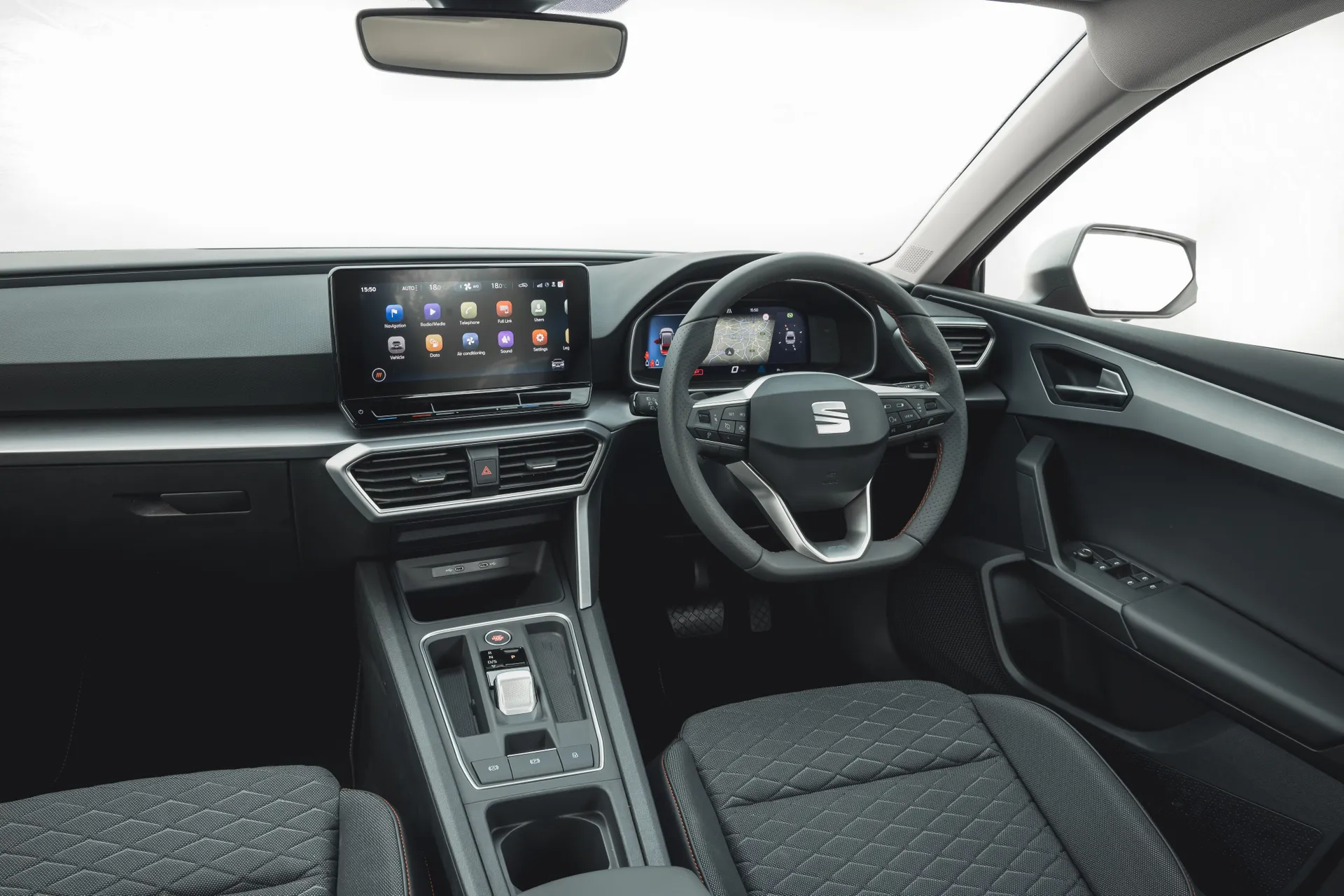
As is the trend at the moment, you'll notice the SEAT Leon Estate's dashboard is almost entirely button-less. Pretty much everything is controlled through the central infotainment system, while a touch-sensitive pad is used for adjusting the temperature of the climate control. This doesn't always respond and can be annoying to use – especially when it's dark because it isn't backlit, or you're trying to concentrate on the task of driving.
To add to this, FR models come with fancy lighting in the form of a light bar across the dashboard. Sure, it has the wow factor, but it soon gets irritating when you're trying to drive the car at night. You can turn it off (we did), but that requires navigating the many menus of the media system. On the plus side, it's not all about aesthetics. Part of it will change colour when there's a car in your blind spot, for example, which is a pretty cool safety feature.
These gripes aside, the Leon Estate has a very comfortable cabin. The seats are supportive enough on long journeys (helped by adjustable lumbar support which is standard across the range), and they'll keep you in place during enthusiastic cornering. There's plenty of adjustment in the seats and steering wheel to accommodate the majority of drivers, while the pedals are perfectly placed.
Quality and finish
The SEAT Leon Estate feels almost as plush inside as the Volkswagen Golf, which itself is top of the class in terms of finish. There's an abundance of squishy materials and we get the impression that it will wear well over years of family life.
You'll find a few harsh plastics here and there (the centre console feels particularly brittle if you bang your knee on it), but it's an improvement over the previous model.
Even the basic SEAT Leon Estate SE model doesn't look that entry-level inside, with its chrome detailing and two-tone cloth upholstery, although some cost-cutting is evident. Upgrade to the FR and you get ambient lighting (as we've mentioned...), while the FR Sport starts to feel particularly upmarket. This comes with heated front seats, a heated leather steering wheel and sporty microsuede upholstery.
The posh SEAT Leon Estate Xcellence trim gets these features, too, if you're looking at used cars, while the top-spec Xcellence Lux added desirable leather seats as standard.
Infotainment: touchscreen, USB, nav and stereo in the SEAT Leon Estate
Technology has taken a huge leap forward with the latest SEAT Leon Estate, but we're not entirely convinced about its execution.
As we mentioned above, you can adjust the temperature using a touch bar below the main infotainment display. This is the kind of thing which will look cool when demonstrated at a dealership but, the first time you try it on a rainy motorway, you'll realise that a simple knob is much easier. We're baffled as to why SEAT didn't make the bar backlit either, as it's totally unusable at night.
The entry-point SE model comes with a 10.4-inch navigation system which is well-positioned for glancing at while on the move, and looks pretty sharp with slick graphics. Again, though, it's just not that useable. It doesn't help that things like the selectable drive modes can only be changed by traipsing through menus, or you can use the voice control function. This is woken up by saying 'Hola, Hola', which is gimmicky and even a bit embarrassing.
Move beyond the SE and you get a larger 12.9-inch screen for the infotainment, while all new Leons have a Digital Cockpit main dash display similar to that in Audis.
All models come with Apple CarPlay and Android Auto, while wireless phone charging is standard on all but SE and SE Dynamic trim levels.
Space and practicality: SEAT Leon Estate boot space
Even though family buyers are now sold on SUVs, the humble estate car is still a hugely practical choice. The SEAT Leon Estate can carry an impressive 620-litres of luggage – that's 110 litres more than a SEAT Ateca. Sure, the Skoda Octavia Estate continues to take the plaudits for boot space in this class, but most people will be pleasantly surprised by how roomy the Leon wagon is. Do remember the plug-in hybrid model's boot is reduced to 470-litres thanks to the batteries under the floor.
There are further advantages to the Leon Estate over a crossover alternative. The boot lip is much lower than you'd get in an Ateca, meaning it's much easier to lift items in. If you wish to transport a dog, they'll find jumping in much easier, too.
Luggage capacity aside, the Leon's a spacious car. There's enough room up front for the tallest of adults, and there are plenty of storage areas in the cabin. A pair of adults will be comfortable in the back, too, and there are Isofix child seat mounting points on the outer rear seats.
The Seat Leon Estate's dimensions are broadly comparable with rivals, at 4,642mm long, 1,799mm wide and 1,437mm tall. Despite its impressive practicality it's actually shorter than the less spacious Ford Focus Estate.
Handling and ride quality: What is the SEAT Leon Estate like to drive?
"Although the SEAT Leon is mechanically very similar to the Volkswagen Golf and Skoda Octavia, it's the sportiest of the trio in terms of handling. Even with the extra mass of the estate model, it remains very composed on twisty sections of road while the steering is sharp and direct."
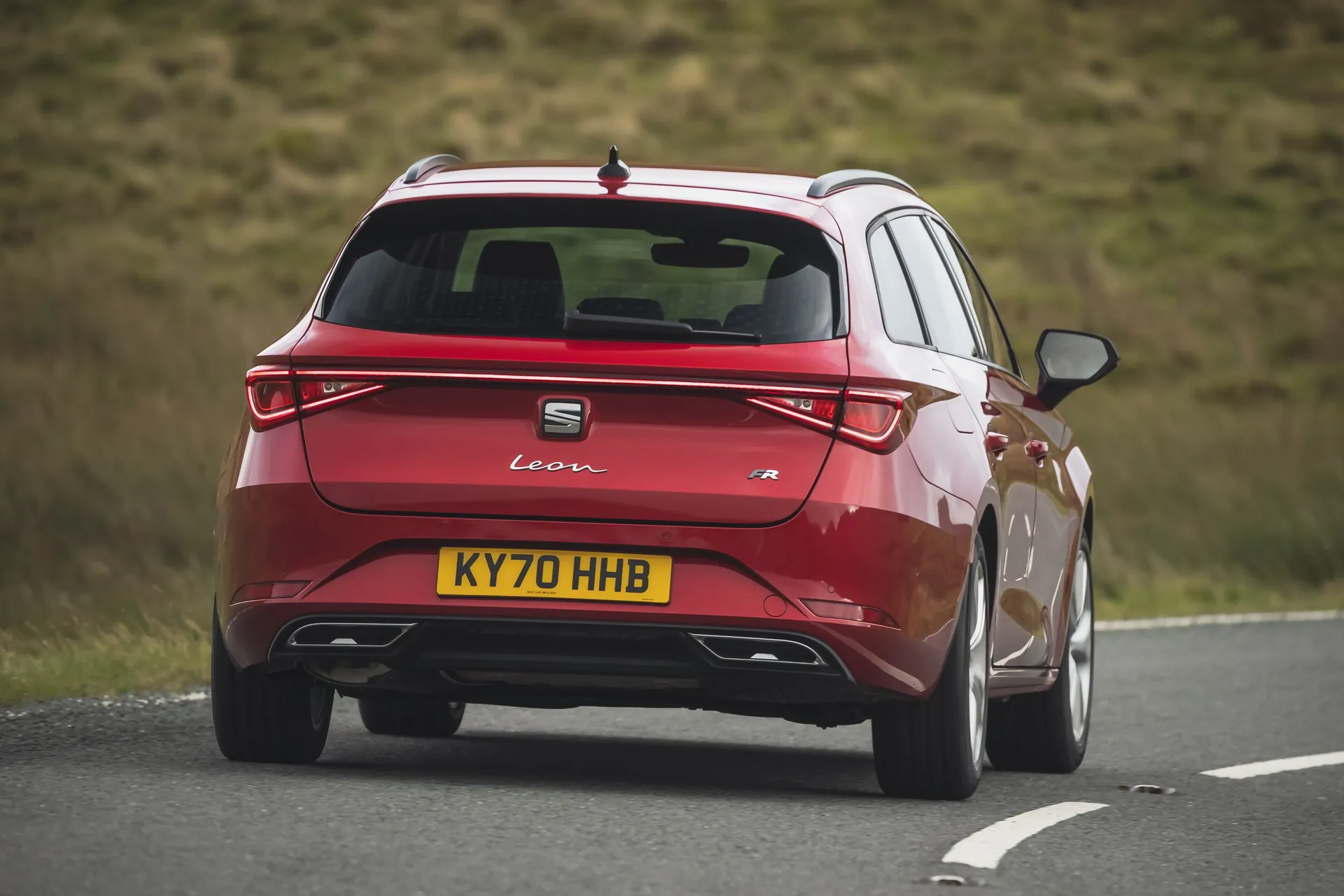
The SEAT Leon Estate good around town, with steering that doesn't require arms like Popeye and reasonable visibility. And even the most affordable model comes with front and rear parking sensors, while SE Dynamic models and above get a reversing camera, too.
Out of town, the FR model (with its sports suspension) corners almost as well as the Ford Focus Estate – the wagon of choice for the most enthusiastic drivers. Of course, if you do buy a Leon Estate with the sports suspension, you'll have to be prepared for a few bumps to make their way into the cabin. It's not uncomfortable but it is definitely on the firm side, something you ought to bear in mind if you live in an area with a lot of speed bumps or broken road surfaces.
Even with its standard suspension setup, the Leon Estate isn't as smooth-riding as the Volkswagen Golf or Skoda Octavia. The firmest model in the range is the e-Hybrid, which is understandable as it has to cope with the extra weight of its batteries.
What engines and gearboxes are available in the SEAT Leon Estate?
Considering a lot of Leon Estate buyers will be looking for a car to trawl the motorway network, SEAT's was a bit tardy in adding a diesel to the range. A 2.0-litre diesel with 115PS was added in 2021, but that does mean used models are rarer and more expensive. There is also a much better, punchier 150PS version of this diesel motor offered in FR models.
The entry-level estate is powered by a 1.5-litre petrol producing 115PS. The big seller, though, will be the 150PS version of the same engine, but this unit is only in the FR trims. It's available with or without mild-hybrid technology (the latter badged the eTSI and with a DSG automatic gearbox as standard).
The performance of the 150PS 1.5 eTSI petrol is very similar to any other mid-range petrol engine offered in rival estate cars. It might be hybrid by name, but it's not really hybrid by nature – it can't run under electric power alone and you won't really notice a difference in the way it drives. Acceleration from 0-62mph takes 8.7 seconds which isn't anything special (and only 0.3 of a second quicker than the standard 1.5 TSI) – but few buyers will find it lacking.
Like a lot of dual-clutch automatic gearboxes, the DSG transmission can become flustered at times but, generally, it's perfectly acceptable.
There's also a plug-in hybrid model, badged the e-Hybrid. This combines a 1.5-litre petrol engine (replacing the earlier 1.4-litre version) with an electric motor, producing an impressive 204PS in total. This is the quickest of the bunch, accelerating from 0-62mph in 7.9 seconds. Of course, most buyers will be considering the Leon Estate e-Hybrid for its low running costs (and eco-credentials) rather than its pace. We'll come onto that below.
Refinement and noise levels
The SEAT Leon Estate does a good job of mimicking a bigger, pricier car in terms of refinement. Very little wind or engine noise makes its way into the cabin, although the sports suspension and 17- or 18-inch wheels of on FR cars do transmit a little more road noise than we'd really like. That said, it's nothing that isn't drowned out by the radio easily enough.
For a truly civilised experience – especially around town – opt for the plug-in hybrid model. This can travel for up to 38 miles before the petrol engine kicks in, meaning you'll bimble around town in silence.
Safety equipment: How safe is the SEAT Leon Estate?
Euro NCAP – the body which crash tests all new cars – has tested the hatch, which scored five stars, and we'd expect the Estate to be similarly robust in a collision.
There's a load of clever safety tech available on the Leon Estate and – pleasingly – it's not just the preserve of expensive high-spec models. All trim levels come with SEAT's front assist system, which uses radars to detect traffic ahead. If it detects an impending collision, it warns the driver and will even apply the brakes if required.
A lane-keeping assistant is also standard (although, in our experience, this is more an irritant than actually useful – while turning it off will trigger an annoying warning light on the dashboard). The Leon Estate also comes with Isofix points on outer rear seats, making fitting child seats, erm, child's play.
Opt for a high-spec Leon Xcellence Lux as a used buy and it comes with the Safety and Driving Pack, which consists of predictive and adaptive cruise control (including a speed limiter), high beam assist and dynamic road sign display.
MPG and fuel costs: What does a SEAT Leon Estate cost to run?
"Flick through a brochure for a SEAT Leon Estate and the e-Hybrid's fuel economy stats will jump out. Officially, the plug-in hybrid returns up to 706.2mpg – a rather incredible figure, but one that's very dependent on how often you actually plug the car in."
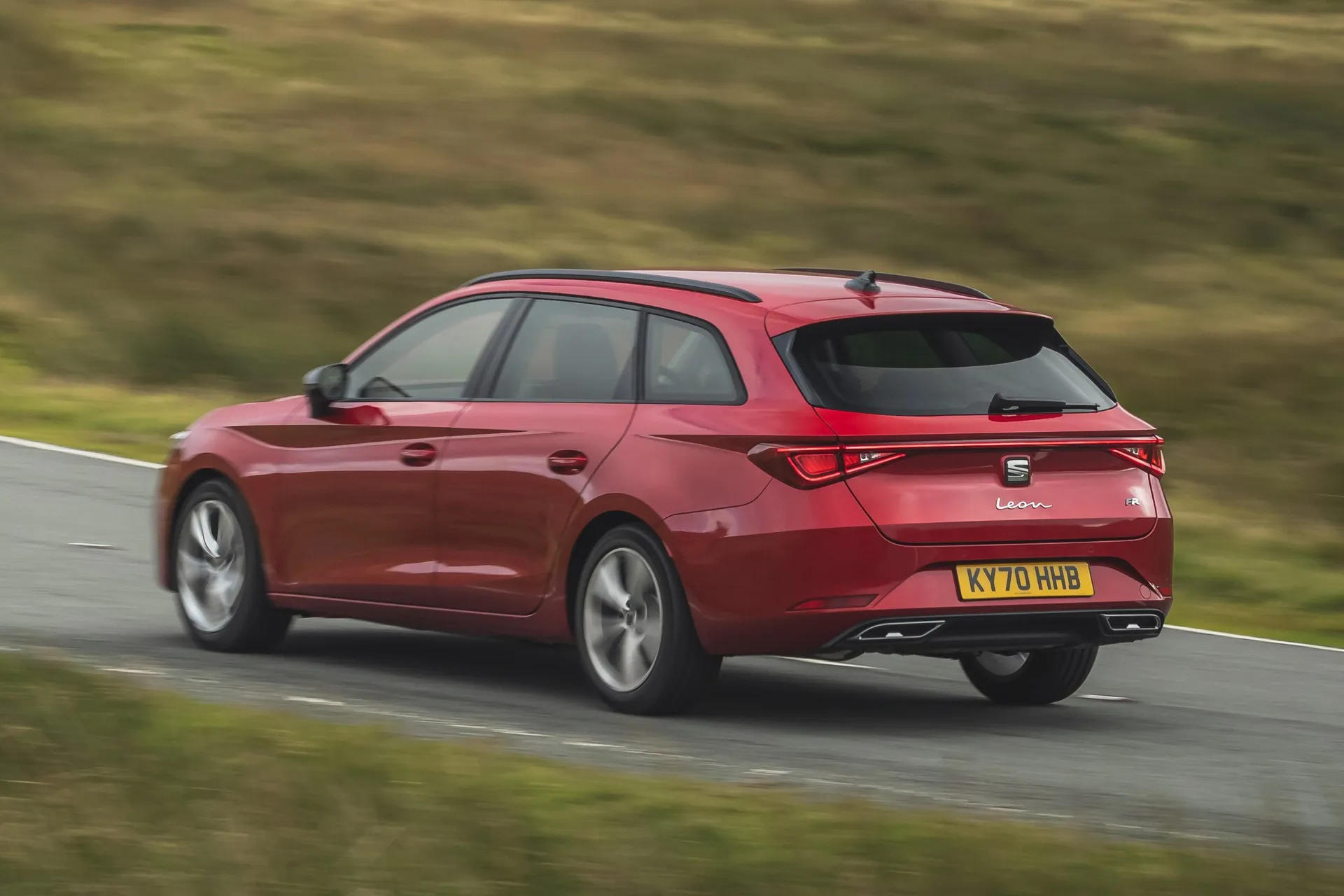
Charging the SEAT Leon Estate e-Hybrid will take around four hours using a home charger and, when it's fully topped up, you'll be able to drive for up to 38 miles before it runs out of juice. That should be sufficient for popping to the shops, driving to work or taking the kids to school. When you need to travel further afield, the Leon will obviously be capable of that, too – but don't expect to see that 706.2mpg on a long journey without regular charging stops. The previous 1.4-litre plug-in claimed 235.4mpg, which was more like 45mpg in real-world conditions if you didn't charge up at every opportunity.
Plug-in hybrid aside, the 130PS 1.5-litre eTSI petrol is most efficient (officially capable of up to 53.3mpg), while the 150PS eTSI version returns up to 52.3mpg). Choose the 115PS 1.5 TSI without hybrid tech and it delivers up to 50.4mpg, with the 150PS version giving 48.7mpg.
If you really need an ultra-frugal Leon Estate capable of covering long journeys on only a thimble of fuel, the 2.0-litre TDI 115 diesel promises to return over 60mpg, with the 150PS model not far behind on 57.6mpg.
SEAT Leon Estate reliability and warranty
SEAT was the lowest performing VW Group brand in the latest HonestJohn.co.uk Satisfaction Index. While that could be cause for concern, we know that the Leon Estate's basic mechanicals and electrical systems are shared pretty much wholesale with its sibling cars from VW and Skoda.
The VW Group has had problems with its latest infotainment system found in the Leon, which can glitch and freeze, requiring an update from the dealer.
SEAT Leon Estate insurance groups and costs
The SEAT Leon Estate's insurance groups range from 12 to 25, depending on specification and engine choice. The cheapest SEAT Leon Estate to insure will be a basic SE model with the 115PS 1.5-litre TSI engine. It's worth noting that the estate's insurance groups are broadly in line with the hatchback, so the extra boot space shouldn't contribute to higher premiums.
Insurance groups for the e-Hybrid models range from 26 to 27, making them the priciest to insure due to their complexity and the performance on offer. Don't let that put you off, though – no Leon Estate should cost the earth in insurance unless you're a particularly young or inexperienced driver.
VED car tax: What is the annual road tax on a SEAT Leon Estate?
The first year's VED (road tax) is based on CO2 emissions and lumped into the on-the-road price. That means, unless you're buying brand new, you won't have to worry about it. Even if you are, the Seat Leon Estate's pretty efficient so you'll pay between £440 and £540 for the initial 12 months for most models. The eHybrid comes in at a more friendly £110 for the first year's road tax.
After the first year, all Leon Estates will pay the same £195 rate from April 2025 when they reach their first birthdays. It's also worth bearing in mind the priciest Leon Estate may have a list price below £40,000 but it's close enough that a couple of optional extras could tip it over this threshold an incur the £425 levy for cars costing more than this - a tax that is charged up to the car passing its fifth year of registration.
SEAT Leon Estate price
"The SEAT Leon may not be a huge seller as a new car, but used buyers know a good car when they see one. This keeps Leon Estate used values stable."
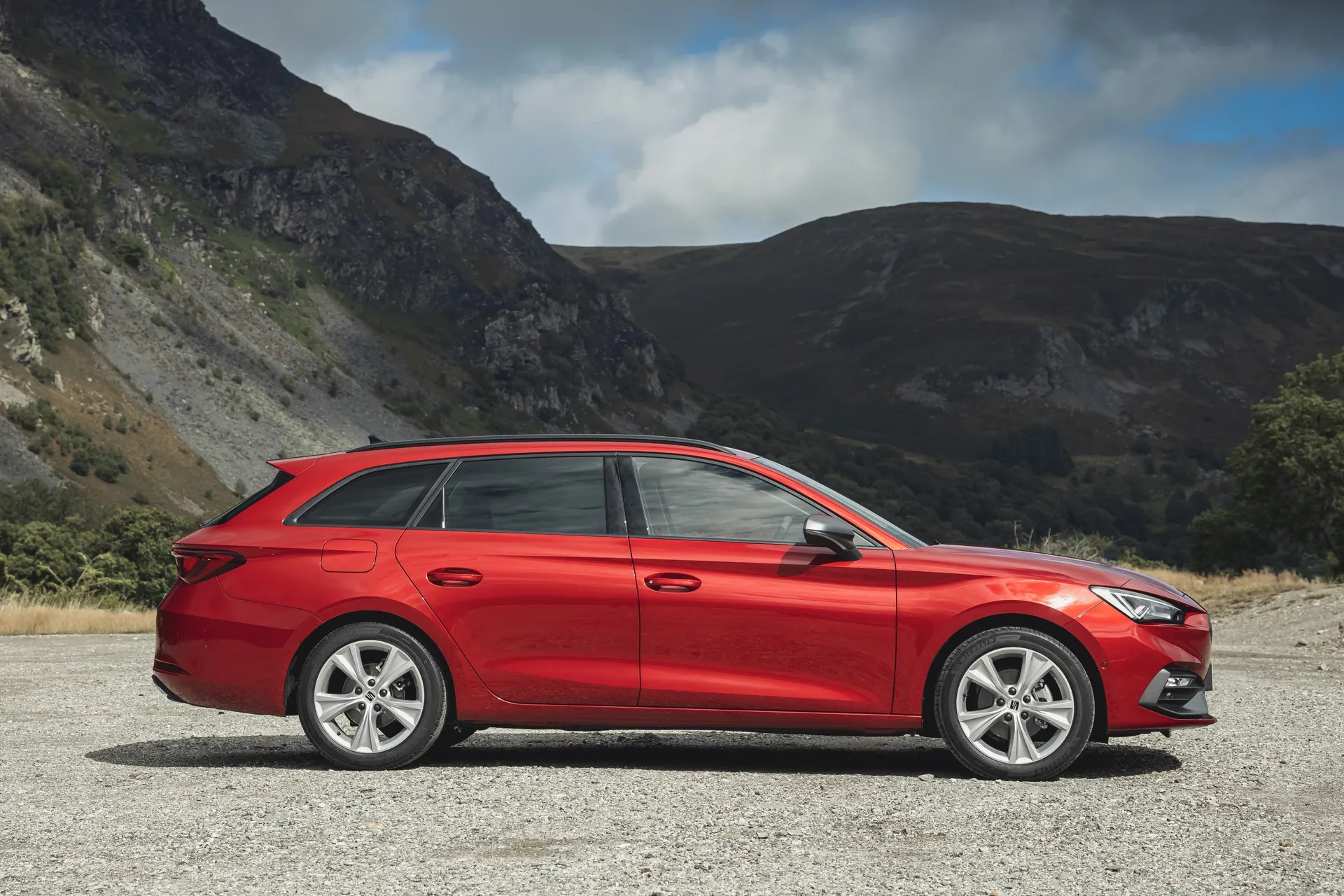
A result of this is you'll pay around £15,500 for a four-year old example with the 1.5-litre petrol engine in 150PS form and 40,000 miles travelled.
Or, you could look for a nearly new pre-registered example with barely any miles on the clock with savings of up to £5000 on the list price from SEAT dealers.
Trim levels and standard equipment
As SEAT doesn't offer extensive options lists, all SEAT Leon Estate models are pretty comprehensively equipped.
The SEAT Leon Estate SE covers the basics with 16-inch alloy wheels, LED headlights (and taillights) and metallic paint. Inside, there's a 10.4-inch media system with DAB radio, Digital Cockpit, Bluetooth and smartphone integration (including Apple CarPlay and Android Auto).
There's some chrome interior detailing, cloth seats and manual height adjustment for the driver and passenger. Electric windows (front and rear) are standard, as well as all-round parking sensors. There's also cruise control, keyless start, front assist and Isofix points on the outer rear seats.
Building on this, the SEAT Leon Estate SE Dynamic looks a bit sharper with 17-inch alloy wheels and tinted rear windows. It also gets an upgraded 12.9-inch media system as well as park assist, reversing camera, and three-zone climate control.
The SEAT Leon Estate FR also looks pretty stylish. It comes with 17-inch alloy wheels, LED headlights, rain-sensing wipers, and bespoke bumpers. There's ambient cabin lighting, auto-dimming rear-view mirror, and wireless phone charging. SEAT's drive profile selection provides four different drive modes, while sports suspension is also standard.
The sporty SEAT Leon FR Sport builds on this with 18-inch alloy wheels, interior wraparound lighting, heated front seats, a leather steering wheel (also heated) and microsuede upholstery. There's a powered driver seat as standard including lumbar adjustment (manual for the passenger).
The posh SEAT Leon Estate Xcellence that used buyers can choose features 17-inch alloy wheels, heated front seats, a leather steering wheel (heated), microsuede upholstery, a powered driver seat (with lumbar adjustment), three-zone climate control, a rear-view camera and SEAT drive profile selection.
Used buyers can also opt for the Leon Estate Xcellece Lux. Highlights include 18-inch alloy wheels, interior wraparound lighting, leather seats, electric tailgate and the Safety and Driving Pack (with dynamic road sign display, high-beam assist and predictive cruise control).
Ask the heycar experts: common questions
Is the SEAT Leon Estate a good car?
Does the SEAT Leon Estate have a big boot?
Where is the SEAT Leon Estate made?
Is the SEAT Leon ST an estate?
Get our latest advice, news and offers
Keep me updated by email with the latest advice, news and offers from heycar.
By submitting you agree to our privacy policy
